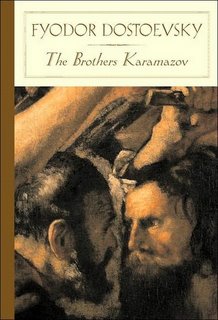The Brothers Karamazov by Fyodor Dostoyevsky
 Seems like I haven’t posted any books here in ages and that’s because I’ve been reading two 900+ page novels simultaneously. This is the first one I finished. I read all of Dostoyevsky’s other novels when I was much younger and was much taken with them, much affected emotionally. A few years ago I tried to reread The Devils (also translated as The Possessed), which affected me profoundly when I first read it, but this time I gave up about 2/3 of the way through, bored with the constant editorializing about revolutionaries. The weak point of 19th century Russian novels, IMHO, is the lengthy philosophizing—something I obviously had more tolerance for in my youth. A recent reread of War and Peace left me frustrated for the same reason, though I have reread Anna Karenina and that novel continues to stand up for me and to be one of my all-time favorite novels. It, though, focuses more on people than ideas.
Seems like I haven’t posted any books here in ages and that’s because I’ve been reading two 900+ page novels simultaneously. This is the first one I finished. I read all of Dostoyevsky’s other novels when I was much younger and was much taken with them, much affected emotionally. A few years ago I tried to reread The Devils (also translated as The Possessed), which affected me profoundly when I first read it, but this time I gave up about 2/3 of the way through, bored with the constant editorializing about revolutionaries. The weak point of 19th century Russian novels, IMHO, is the lengthy philosophizing—something I obviously had more tolerance for in my youth. A recent reread of War and Peace left me frustrated for the same reason, though I have reread Anna Karenina and that novel continues to stand up for me and to be one of my all-time favorite novels. It, though, focuses more on people than ideas.The Brothers Karamazov is the story of a family—really a father and three sons (the mothers are sort of irrelevant and so, in the end, are the various woman around them). The father is not a very lovable character—mean-spirited and ungenerous and a womanizer, he neglected his children after their mothers died. The eldest was Dmitri (Mitya) whose mother died shortly after his birth. His father went off and left him with a servant to be raised as best he and his wife could do. A similar fate awaited the two sons of a later marriage, Ivan and Alexei (Alyosha). Mitya becomes an officer who has to leave the Army because of a duel. He’s a lot like his father—motivated it seems primarily by his own pleasure—drinking and women. He believes his father has cheated him of his inheritance from his mother. Ivan was educated in Moscow but is also pretty dedicated to selfishness. Alyosha on the other had has always lived near the village and at the opening of the novel is an acolyte of the hermit priest of a neighboring monastery. He is gentle and unselfish and forgiving. When the Father Zossima, his patron, nears death he tells Alyosha that his calling is outside the monastery. Once the characters of the four Karamazovs are delineated, the main action of the novel is the murder of Fyodor, the father. Mitya, who was there that night and who had threatened to murder his father, is arrested for murder and the last half of the novel follows his trial, the reader’s near certainty that he is innocent, and sentence to Siberia.
There’s an important religious element in the novel, though not as coherent as one might like. When Father Zossima—who’s teaching seems indeed wise—dies, his corpse begins to stink within the first 24 hours and that is interpreted as a sign from God that he was not as holy as he seemed. Even Aloysha, who nevertheless believes in Father Zossima, is affected. At the end of the novel, a disadvantaged child, Ilusha, dies and his young friends, with Aloysha, note specifically that his corpse does not stink. No editorializing in the text, but the parallel seems to me particularly interesting. Possibly Dostoyevsky sees hope in the "younger generation", Ilusha who died and Kolya and his other friends who look to Aloysha as their mentor.
I enjoyed the novel without being really taken by it. If it had been the first 19th century Russian novel I’d read, I’d have found it interesting as a picture of a Russia heading for the disaster that overtook it in the early 20th century. But it’s not the first I read, but one I read because it was a famous one which I hadn’t read before.


0 Comments:
Post a Comment
<< Home